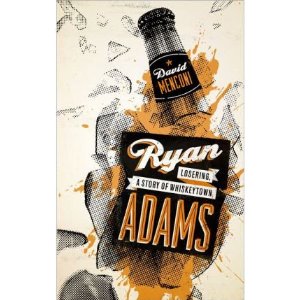
University Of Texas Press
It would have been harder for David Menconi to be much closer to Whiskeytown without actually being in the band. Menconi has been the music critic for the Raleigh, NC-based News & Observer for over 20 years, a role which provided him with a better-than-front-row seat for Whiskeytown’s conception, birth, flourishing, and eventual falling apart. Hand-in-hand with that came numerous conversations with the band’s frontman, Ryan Adams. Menconi’s first sit-down with Adams was at an acoustic songwriters’ evening in 1995 – a post-gig interview for the debut issue of No Depression magazine. Menconi describes the evening as having a “hootenanny-among-friends vibe” but immediately sensed that Ryan Adams “had It, a presence that lit up the room. It was not unlike walking by a pickup basketball game and noticing Michael Jordon on the court.”
By 2000, Whiskeytown was no more. Ryan Adams: Losering, A Story Of Whiskeytown chronicles those five years in-between.
By all accounts, Adams was on a mission to be a rock star from the start. Talent was never an issue: songs would push their way out of Adams’ head like the uncontrollable barks and curses of someone with Tourette Syndrome (leave him alone for a few minutes with a pencil and a cocktail napkin and you had a song; stick him in a car across a couple of states and by the third piss stop you had an album). Couple that with an unpredictable-but-impossible-to-ignore stage persona and you end up with a recipe for stardom – and by the time you get to the end of Menconi’s book, you realize something big had to happen to Ryan Adams … the guy would’ve imploded if it hadn’t.
The thing that was an issue was Adams’ personality and behavior: Menconi offers friends’ recollections of the teenaged Ryan spending a Christmas Day alone in a cemetery, shitfaced – or showing up at a party, grabbing the guitar from the hands of a kid who was entertaining the guests, announcing that, “I’ve only got a minute to blow y’all’s minds” – and making good on his promise. Adams’ attitude didn’t mellow when he hit his 20s. Anyone with even a passing interest in Whiskeytown’s music probably knows at least one horrorshow tale of a gig gone bad. And even if you couldn’t blame every smashed guitar or totaled-out drum kit or “Where-the-hell-did-that-come-from?” impromptu mid-set channeling of Prince on Adams, he was the nucleus of Whiskeytown, deserving of a spot on alt-country’s raggedy-flanneled Mount Rushmore.
Menconi weaves it all together well, combining quotes and stories from others with his own memories and passages from interviews he did with Adams during the period. Along the way, the music critic in Menconi nudges the straight biographer out of the way as he digs into the Whiskeytown catalog – his personal feelings about a particular album or tune are perfectly clear. And the band’s masterpiece Stranger’s Almanac is given special treatment all of its own: most of Chapter Eight is devoted to a track-by-track analysis of the 1997 release, using the music to describe a fictitious drunken night on the town – Menconi speculating that perhaps the album as a whole documents Adams’ feelings when he busted clear of Raleigh, NC to tackle the world.
One key point that Losering offers up is North Carolina being to Ryan Adams what Minnesota represented to young Bob Zimmerman: a place to flee; something to be put behind and mostly forgotten. Adams has kept his distance from his old stomping grounds over the years, once referring to those he left behind in an online post as “a group of people to [sic] afraid to succeed for fear of reprimand.” He finally returned to Raleigh for a gig in the wake of the release of Cold Roses in 2005 – and Jacksonville City Nights, released later that same year, bears the name of the town he grew up in.
In the meantime, Adams has worn a coat of many colors, venturing into pop stardom, quasi-metalheadom, and even spent some time as one of Phil’s Friends. The next chapter of his career is as hard to predict as the last dozen or so. What David Menconi has managed to do is provide the reader with an opportunity to go back and burrow into that mid-90s period of twang, crunch, and spilt-beer beauty known as Whiskeytown.
*****
Brian Robbins has never, ever thrown a guitar into the audience over at www.brian-robbins.com.



No Comments comments associated with this post